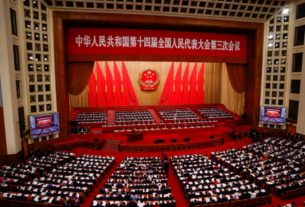The South China Sea dispute has become a major topic in the Philippines’ 2025 election as candidates debate how to handle China’s territorial claims. Tensions have escalated due to Beijing’s military presence and confrontations with Philippine vessels. Voters are demanding clear policies on national sovereignty and security.
“The South China Sea issue affects our economy, security, and future,” a leading candidate said. Many Filipinos want stronger action against Chinese expansion in the region. Others fear aggressive policies could harm trade and diplomatic relations.
China has built military bases on disputed islands and deployed coast guard vessels to control fishing areas. The Philippines, along with Vietnam and Malaysia, has challenged China’s claims through diplomatic protests. The ongoing tensions have led to increased military patrols and confrontations.
The Philippine Coast Guard has accused China of harassing Filipino fishermen and blocking supply missions. In recent months, Chinese ships have used water cannons against Philippine boats. These incidents have fueled anti-China sentiment among voters.
President Ferdinand Marcos Jr. has strengthened defense ties with the U.S. to counter China’s influence. The Philippines has allowed U.S. forces to expand their presence under a military cooperation agreement. Some politicians support this strategy, while others argue for a more independent foreign policy.
China has warned the Philippines against siding with the U.S. in the conflict. Beijing claims the South China Sea as its territory and rejects international rulings against its claims. Chinese officials insist they want peaceful negotiations but continue military activities in disputed waters.
The dispute has economic consequences for the Philippines. The South China Sea is rich in fish stocks and potential oil and gas reserves. Many Filipinos rely on fishing for their livelihood and fear losing access to traditional fishing grounds.
Candidates in the election are offering different solutions to the crisis. Some want to increase military spending and strengthen alliances with the U.S. Others propose direct talks with China to find a diplomatic resolution.
“The next president must defend our territorial rights,” a political analyst said. Many voters expect strong leadership on national security. The election outcome could determine the country’s approach to the South China Sea for years.
The Philippine military has increased patrols near disputed areas. Officials have promised to protect Filipino fishermen from harassment. However, the country’s naval capabilities remain limited compared to China’s powerful fleet.
The 2016 ruling by an international tribunal rejected China’s claims, but Beijing refuses to accept it. The Philippines has repeatedly called for China to respect international law. So far, diplomatic efforts have failed to stop China’s expansion.
Washington has backed the Philippines in the dispute. U.S. officials have warned that any attack on Philippine forces could trigger a response under a mutual defense treaty. This has increased tensions between China and the U.S. in the region.
China continues to expand its artificial islands, adding airstrips and military facilities. Satellite images show increased construction activity in disputed waters. This has raised fears that China is preparing for greater military control over the region.
Economic ties between China and the Philippines complicate the issue. China is a major trading partner, and some business leaders worry that confrontation could hurt the economy. Balancing security and economic interests remains a key challenge.
Public opinion in the Philippines is shifting against China. Many Filipinos view China’s actions as a direct threat to national sovereignty. This could influence voters to support candidates who promise a tougher stance.
For now, tensions remain high in the South China Sea. China continues to assert control, while the Philippines seeks international support. The next government will face critical decisions on how to respond.
The election will determine whether the Philippines strengthens its alliances or pursues diplomacy with China. Voters are demanding clear strategies from candidates. The future of the South China Sea dispute may depend on the outcome.




